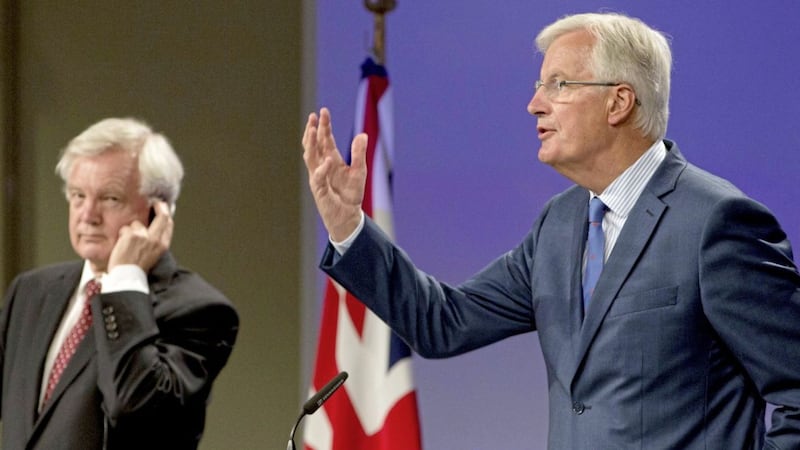It seems likely that Brexit will not now happen with the finality demanded by Brexiteers or feared by Remainers.
Summer negotiations have substantially affected the trajectory of travel. But they weren’t the official Brussels talks between EU representative Michel Barnier and British minister David Davis.
Instead, the critical negotiations have been quiet, intensive and largely unnoticed conversations happening informally in coffee shops and restaurants, private clubs and boardrooms, across Whitehall and the City of London. (A ‘parallel process’, so to speak.) These are the negotiations that are impacting most significantly on Brexit’s trajectory.
An increasing consensus has been lobbied in Whitehall and the City, across political, financial and security sectors, for a stable and transitional (and, whisper it softly, perhaps potentially open-ended) approach to Brexit.
Despite the noisy Brussels negotiations, a transitional approach actually suits the EU as much as the UK – even if a few British eye-teeth still need symbolically pulled during the fight.
As outlined in this column four weeks ago:
“There are some signs that Whitehall’s policy thinking is shifting towards the pragmatic logic of longer-term and transitional processes.
``Deliverables are being distinguished from ‘desirables’. Five years of fuller transition, rather than two years for final walkout. New possibilities of EU engagement, rather than false glories of UK isolation. Making deals, rather than making demands. Symbolically respecting the narrow democratic vote for Brexit, while substantially redefining the actual outcome.”
Ten days ago, Labour’s shadow Brexit spokesperson Keir Starmer announced in The Observer:
“There is now near consensus that a transitional period is an economic and political necessity. (…) Labour would seek a transitional deal that maintains the same basic terms that we currently enjoy with the EU… to remain in a customs union with the EU and within the single market during this period.”
Mr Starmer’s significant intervention was not simply about Labour’s electoral positioning. He’s a highly respected former Director of Public Prosecutions - influential and intelligent. His policy announcement was framing the public and political narrative, opening up common ground for Tory Remainers before Westminster begins considering the second stage of the Brexit withdrawal legislation tomorrow.
Talking to well-informed influencers in London, Dublin and Belfast during summer months, the logic of a transitional approach to Brexit was pragmatically being raised as common cause. Yet, regarding Keir Starmer’s intervention, some key Remain voices in Britain and Ireland didn’t even see it coming. That strategic weakness is concerning.
Moreover, publicly, former Tory chairperson Chris Patten was calling Brexit a “disaster”, adding: “We can and should manage the consequences of this break-up without bringing further woes down on our heads.” Ex-Tory leader William Hague was backing a transitional approach that “could rescue Brexit from an approaching disaster”. Bank of England governor Mark Carney was blaming Brexit “uncertainties” for a slowing economy.
The UK’s recent ‘position’ papers are, in reality, only ‘discussion’ papers. London’s core negotiating preference was outlined by chancellor Philip Hammond last week during his visit to Dublin. Referencing the importance of Ireland’s peace process, and the border’s economic, cultural, social and political context, Mr Hammond said:
“We also want to agree a time-limited interim period to provide certainty and avoid a cliff edge for business and individuals during the transition from the current structures of membership to a new special relationship with the EU.”
That invites immediate and intensive pragmatic discussions about more effective north-south joint administration (though probably not yet joint authority); an enhanced type of strategic, short-to-medium term ‘two states, one system’ approach - something that’s happening operationally everyday across this island in finance, healthcare, policing, crisis management, infrastructure, and so on.
A pinch point occurs with the Tory Party’s annual conference in October, and two weeks later the major EU Council meeting on Brexit negotiations.
If hardline opposition in Westminster kills the consensus for a Brexit transition, then we’ll face nuclear fallout. One, a hard Brexit with little or no EU agreement would become almost inevitable. Two, prime minister Theresa May would fall and her government would be badly damaged (as might Labour). Three, Ireland’s diplomatic ability to influence Brexit – especially at formal intergovernmental level – would diminish.
A transitional Brexit offers some basic chance of stable, bespoke arrangements for the north. Alternatively, the political, economic and social consequences of a hard Brexit would create major risks for both jurisdictions in Ireland, with all the related negative consequences (economic instability, increasing racism, rights regression). Plus there’s the global unpredictability of ‘events, dear boy, events’.
The Brexit policy challenges facing Ireland today – north and south – are now entering their most critical phase to date. The related risks are further deepened without a properly functioning local executive and North-South Ministerial Council.








